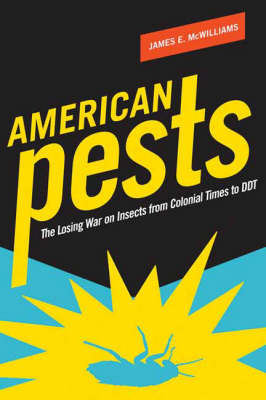
American Pests
Columbia University Press (Verlag)
978-0-231-13942-7 (ISBN)
The world of insects is one we only dimly understand. Yet from using arsenic, cobalt, and quicksilver to kill household infiltrators to employing the sophisticated tools of the Orkin Man, Americans have fought to eradicate the "bugs" they have learned to hate. Inspired by the still-revolutionary theories of Rachel Carson's Silent Spring, James E. McWilliams argues for a more harmonious and rational approach to our relationship with insects, one that does not harm our environment and, consequently, ourselves along the way. Beginning with the early techniques of colonial farmers and ending with the modern use of chemical insecticides, McWilliams deftly shows how America's war on insects mirrors its continual struggle with nature, economic development, technology, and federal regulation. He reveals a very American paradox: the men and women who settled and developed this country sought to control the environment and achieve certain economic goals; yet their methods of agricultural expansion undermined their efforts and linked them even closer to the inexorable realities of the insect world.
As told from the perspective of the often flamboyant actors in the battle against insects, American Pests is a fascinating investigation into the attitudes, policies, and practices that continue to influence our behavior toward insects. Asking us to question, if not abandon, our reckless (and sometimes futile) attempts at insect control, McWilliams convincingly argues that insects, like people, have an inherent right to exist and that in our attempt to rid ourselves of insects, we compromise the balance of nature.
James E. McWilliams is an associate professor of history at Texas State University-San Marcos and a recent fellow in the Agrarian Studies Program at Yale University. His articles have appeared in the New York Times, Los Angeles Times, and Washington Post, among other publications, and he is the author of A Revolution in Eating: How the Quest for Food Shaped America and Building the Bay Colony: Local Economy and Society in Early Massachusetts.
Acknowledgments Introduction. "The Dunghill of Men's Passions": The Insect Paradox 1. "The Insect Tribes Still Maintain Their Ground": Insects and Early Americans 2. "There Is No Royal Road to the Destruction of Bugs": The Rise of the Professionals 3. "Let Us Conquer Space": Breaking the Plains and Fighting the Insects 4. "A Great Schemer": Charles V. Riley and the Broken Promises of Early Insecticides 5. "Let Us Spray": Mosquitoes, War, and Chemicals 6. "Vot Iss de Effidence?": Residues, Regulations, and the Politics of Protecting Insecticides 7. "Complaints Are Coming In": A Year in the Life of an Insecticide Nation, 1938 8. "Let's Put Our Heads Together and Start a New Country Up": Silent Springs and Loud Protests Epilogue. "Some Very Learned Men Are the Greatest Fools in the World": In Praise of Localism Notes Bibliography Index
| Erscheint lt. Verlag | 17.6.2008 |
|---|---|
| Zusatzinfo | 35 illus. |
| Verlagsort | New York |
| Sprache | englisch |
| Maße | 152 x 229 mm |
| Themenwelt | Geschichte ► Teilgebiete der Geschichte ► Technikgeschichte |
| Weitere Fachgebiete ► Land- / Forstwirtschaft / Fischerei | |
| ISBN-10 | 0-231-13942-X / 023113942X |
| ISBN-13 | 978-0-231-13942-7 / 9780231139427 |
| Zustand | Neuware |
| Haben Sie eine Frage zum Produkt? |
aus dem Bereich


